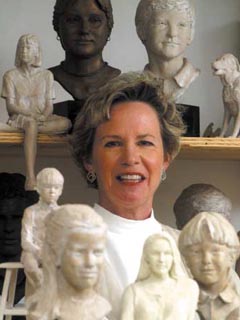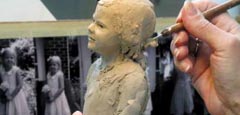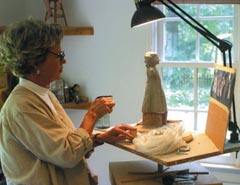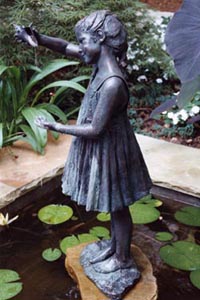| Cover Story,
South Charlotte Weekly, 1st week of August 2003
Ageless Art
Immortalizing innocence
Foxcroft sculptor's creations capture more
than physical likeness
By Lee McCracken

After her first career as a psychologist, Cantey Kelleher of Foxcroft
became a sculptor 18 years ago. She's done figures of men, women, children and pets
and currently has a five-year waiting list.
SCW photos by Sean Busher.
Cantey Kelleher's second career has captured not only her
heart and soul but her time. While she could be enjoying retirement
with her husband, John, she instead is finger-deep in clay.
Kelleher (formerly Gannaway) has been sculpting likelike
portraits for nearly 18 years and filling Charlotte homes
with cherished works of art. Her miniature portrait figures
capture the essence of each subject - man, woman, child or
pet.
Twenty years after touring a sculpture garden in Charleston
and taking her first classes at Queens College (now Queens
University), Kelleher is an accomplished portrait sculptor
and teacher. "I stay very busy," she said. Indeedm
she has a five-year wating list.
A "people person" by nature, Kelleher's work has
taken her from studying the mind - as a psychologist in the
70's - to studying and sculpting the whole person. Her pieces
are well known for physical likeness, as well as revealing
a person's character. "I always loved sketching, and
I've always loved the studying the human figure," she
said.
Kelleher takes pride in her work with children, capturing
them "just being themselves in natural, casual poses."
For hours, days and weeks, she pinches, presses and forms
a mound of clay into a sweet girl with an upturned nose or
a young boy whose eyes expose his hunger for knowledge.
Whether Kelleher's finished pieces make Fathers cry or children
squeal with delight, they almost always steal a moments breath.
More scientific than creative
A Charlotte native, Kelleher and her husband live in the
Foxcroft home where she raised her two children, Preston and
Gray Gannaway. Her daughter, Preston, is a photojournalist
and recently moved to Bangor, Me., from Santa Fe, N.M.. Gray
graduated this year from UNC-Asheville with a degree in music
technology and moved to Portland, Or. to "seek his fortune."
John, who is recently retired from Merrill Lynch, also has
two grown children who live in Charlotte. Brendan, who is
married and has two children, works at Merrill Lynch, and
Faith is an attorney.
Kelleher attended Hollins College in Roanoke, VA., for two
years before transferring to UNC, where she earned a degree
in psychology. She practiced for seven years before stopping
to raise her children.
In the mid 80's, after she fell in love with sculpture in
Charleston, Kelleher discovered an interest in working with
clay. She enrolled in portrait sculpture classes at Queens,
and in 1986 Kelleher was commissioned to do her first sculpture
of a child.
"My first commission was $200 - I was so nervous and
so thrilled," she said. "Carol Joyner, who is a
good friend and landscape designer, had seen my work and told
someone she knew about it. Since then I have become known
as someone who sculpts children."
While she sculpts two-thirds to life-size portrait figures
as garden pieces and fountains, what sets Kelleher apart are
her miniature figure portraits. "Most sculptors do busts
ot they do life-size," she explained.

Cantey Kelleher said children become invested in the sculpture and
enjoy surprising a parent when the project is completed.
Although she works primarily with children, Kelleher has
sculpted adults, including sports figures, such as Coach 'Bear'
Bryant. "In the early 90's some businesmen hired me to
do him and flew me down to the museum in Alabama." She
also sculpted NASCAR driver Davey Allison and his father before
his death.
In 1990 she was awarded Best of Category and Best of Show
from the N.C. State Ceramic Association. "I have stayed
so busy doing commission work tha I have not shown my work
since then," Kelleher said, noting that she sculpts and
teaches because she's passionate about the art, not the recognition.
"I'm not trying to grow my professional career - it's
something that I love, and it's part of who I am." Kelleher
said one of her wishes is to have more time to do pieces for
her own enjoyment. In fact, she's beginning a bust of her
own son.
"I'd love to do children in ballet and adults engaged
in dance. I love the anatomy, the physiology." Kelleher
said.
"I see my art as more scientific than creative. I interpret
what I see with a child, because I am trying to be very representational.
It's very disciplined - I'm working with calipers and taking
measurements, and then I use a calculator to convert my measurements
to the scale. So it's very mathematical."
Kelleher said she's very realistic with facial features and
the body, but her style is "painterly" when it comes
to clothing and accessories. "I do take some license
in straightening teeth, shedding a few pounds or curling the
hair when requested," she added.
"The longer I do it, the better I get - practice makea
big difference."
Secret surprises
Kelleher enjoys both the mental aspect of studying photographs
and making her pieces exact likenesses of her subjects and
the handling of the clay. She also takes pleasure in making
new friends.
"I love getting to know the children. It's so much fun,"
she said. "And the children enjoy it. The very youngnes
might be shy at first, but the teenagers really love it. One
said, 'That's a mini me!' when he saw his sculpture."
Kelleher said most children become very invested in the sculpture
and enjoy the fact that it will be a surprise for a parent.
"It's a project we work on together with some secrecy."
She added, "And then, of course, I love running into
my children years after I've done their portrait and seeing
how they've grown and changed."

Along with creating her own work, Cantey Kelleher
teaches
sculpture in her home on Abingdon Road in Foxcroft.
Kelleher meets with clients for 45 minutes to an hour at first,
just talking and taking photographs from every angle. "I
am sculpting the back of the head (or the body) as well as
the front," she eplained. She'll also measure her subjects
and often use a video camera.
"I always have the parents involved when the piece is
still wet for the final stages - I consider it teamwork,"
she said. "The way I see the child may not be the way
the mother sees the child. I had one father say, 'That's my
son, but that's not his ear.' So we had to tweak that."
Not only is it gratifying when a finished piece brings tears
to a parent's eye but also when the children see the portrait.
"To see the children smile - the pride that they feel."
Miniature figures generally take one to two months to sculpt
and then up to two months to cast. "I work in water-base
clay - terra cotta - I like the way it feels. It takes a little
while to dry it out and fire it." The finished pieces
are shipped to a foundry in Colorado or New York City. Sculptures
can be hand-cast in marble or bronze, which allows for inexpensive
duplication of the original piece. "Most of my work is
cast in bronze - a lot of parents want copies of castings
for grandparents," Kelleher said.
"Robbie," sculpted in 1997, may be recognized because
the piece is in the garden of a home that was on the Mint
Museum tour this year. "Robbie is two-thirds life-size."
Kelleher's miniature figure portraits are in homes throughout
the area, as well as across the country and overseas.

This 30-inch bronze garden fountain, called "Robbie" costs in the
$20,000 range.
"Something Robbie's size would be in the $20,000 range
and the miniature figures in the $4,000 - $7,000 range, so
there's a lot more demand for them," she said.
Some parents ask for three or four children in one composition
but usually decide against a connected composition. "One
reason is that it would be very large and heavy. Another reason
is they decide they want each child to have his or her own
casting."
Students show off talent
Kelleher, who taught portrait sculpture at Queens in the mid
90's for several years, now teaches small classes of adults
in her home studio.
Students in her 10-week sessions include retired business
executives, attorneys, a hand surgeon, a physical therapist,
a dental hygienist, homemakers and grandmothers. "I think
my students really enjoy the class, but I learn so much from
them, too."
Amy Sturkey, a physical therapist who has been studying under
Kelleher for five years, said the classes are her own therapy.
"She has a way with constructive comments - she always
starts with how wonderful the piece is you are working on."
And even when Kelleher suggests reworking a piece and starting
over from scratch, Sturkey said, "You end up thinking
it's a wonderful idea."
A number of her students have won awards and sold their work;
one student has started her own business.
Wilton Parr has been studying under Kelleher since she began
teaching. "He is so accomplished, and he's so generous
with his time," she said, noting Parr sculpted the figures
in the atrium at Providence United Methodist Church.
"I have a waiting list for students, as well, since most
people sign up again from session to session. Some are working
on their children or grandchildren and have been with me for
years," she said. Kelleher added that she is not looking
for more students, but she responds to inquiries on her Web
site at www.cantey.net.
Kelleher's legacy goes beyond those who can afford to take
her classes. Last summer she taught a class at the Urban Ministry
Center, and Kelleher proudly shows off photos of their work.
"One of the girls was incredibly talented," she
said.
Lawrence Cann at the Center accepted Kelleher's donation of
the materials she left and has begun to teach his own classes
in sculpture at the shelter.
Kelleher and six of her students are in Colorado this week
at the country's largest outdoor sculpture show. The annual
Loveland Sculpture Invitational features more than 300 artists
from across the nation displaying over 3,500 sculptures, from
miniatures to monuments.
Sturkey said she feels blessed to know Kelleher as a person
and a teacher. "Cantey is a magnificent person... Just
being around her makes me happy."
While Sturkey has learned that "pictures, pictures, pictures"
and having a subject in 360 degrees are important for portrait
sculpture, the most important lesson Kelleher has taught her
is "if you don't have the eyes, you don't have the person."
~~~
To save this article as a .pdf, Right Click here
and choose "Save Target As"
|
|
